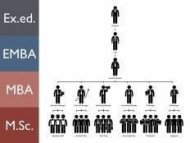If you’re wondering whether an MBA or an EMBA(Executive MBA) is right for you, envision what your company will look like in 15 years. In Japan, you’ll probably find that hardly any of your colleagues or superiors have an MBA or EMBA. The reason for this is simple: MBA programs only began being offered in Japan in the year 2000. Now, over 15 years have passed, and there is a growing awareness that working adults need to brush up on their skills from time to time. There is currently a huge increase in the number of participants in MBA programs—and 15 years from now, a great many of your future subordinates and superiors will be joining your company with MBAs in hand. Right now, you might get a number of questions about “why are you bothering with an MBA?”, but in the near future, this approach will be recognized as far-sighted: “you have managerial ambitions, don’t you?”
EMBA/Executive MBA rankings
Actually, it is reported that 1 in 4 employees in managerial positions at listed companies in the United States hold a Master’s degree; the qualification is not all that rare in the West. In Europe, there are even “double Master’s” or “joint degree” programs that confer another Master’s degree upon program completion, in addition to an MBA. In the West, where MBA programs were developed, it is common for MBAs to be obtained at a younger age and EMBAs to be attempted after gaining a good degree of practical work experience. Therefore, EMBA and MBA programs are ranked separately. The distinction is particularly salient in the West, and those working for Western companies are advised to have a clear grasp of it.
The differences in curriculum between an MBA and an EMBA
The curricula in EMBA and MBA programs are basically similar, but since EMBA programs boast a higher percentage of enrollees with executive positions, even discussions on identical corporate case studies tend to focus on different areas than MBA programs. This could be cited as the most prominent difference between the two programs. While MBA programs are targeted to candidates for middle management, EMBA programs are targeted to those who are already middle managers or higher. In other words, it is presumed that these enrollees will become the pillars of their businesses after graduation, so class discussions are expected to hew more closely to an executive’s perspective.
Therefore, as suggested by the titles of the programs, the learning objectives of MBA and EMBA programs must differ. Take, for example, the classic example of leadership, a perennially important topic at business schools; the leadership styles discussed will naturally change depending on whether participants are in an MBA or EMBA program.
| Executive MBA | 2 years | 30-50 | 15 years | Middle management | Top management |
| MBA | 2 years | 20-40 | 3 years | Junior management | Middle management |

 Brochure
Brochure
 Info Session
Info Session
 Application
Application
 Alumni Voices
Alumni Voices






